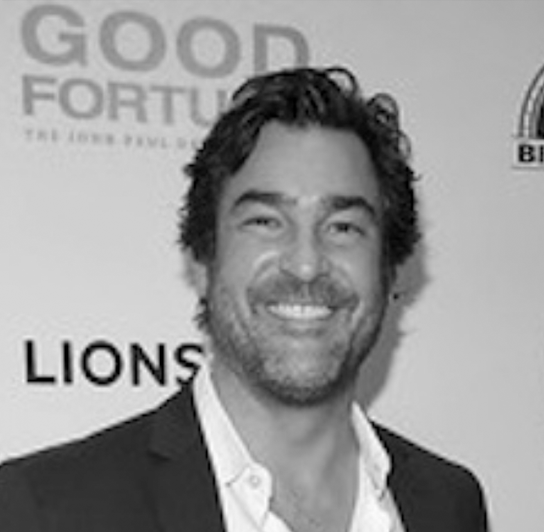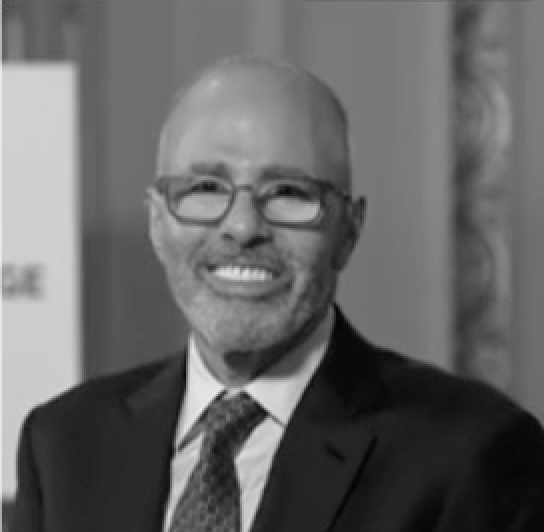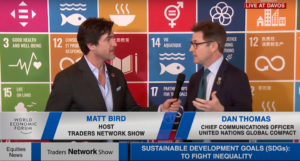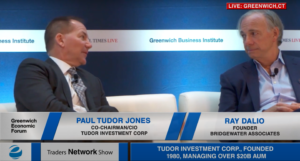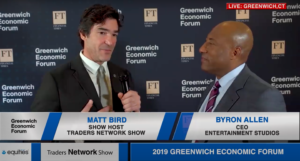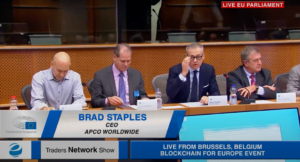Getting back on track: Paul Tudor Jones and Ray Dalio discuss how the economy took a wrong turn—and how we can steer it in the right direction
Contributed by: Show Editorial Team
Paul Tudor Jones, Co-Chairman/CIO of Tudor Investment Corp., interviews Ray Dalio, Founder of Bridgewater Associates at Greenwich Economic Forum (Greenwich, CT)
Our economy is swerving off the road, and the true cause is being ignored.
“It’s like asking somebody why they are driving funny and not mentioning the fact they had 10 shots of vodka beforehand,” Paul Tudor Jones, Co-Chairman/CIO Tudor Investment Corporation, said during a conversation with Bridgewater Associates Founder, Ray Dalio, at the 2019 Greenwich Economic Forum.
The fireside chat, delving into the issues Dalio lays out in his piece “The World has Gone Mad and the System is Broken,” dissects the underlying reasons for the growing wealth gap, analyzes political implications on the economy and the stock market, and offers solutions that could right the economy.
“The world is awash with money,” Dalio said in the chat. And yet that capital is not divided evenly. During the 2008-2009 mortgage crisis, the government slashed interest rates to stimulate the economy, Dalio explained. But the financial situation was still so dire that the government took the next logical step of printing money and buying financial assets. This move gave corporations a windfall, to the tune of $15 trillion—a windfall that, in theory, could have trickled down to prop up the entire economy, but in reality helped only those at the top, Dalio said. Instead of investing in social initiatives or other programs that could benefit the majority of Americans, corporate leaders bought stock or put their money into venture capital projects that collect wealth before even proving they are profitable (think Uber and WeWork).
“As a result of the accumulation of the money at the top and technology, we have a situation in which, naturally, those who have money have a lot of money and credit,” Dalio said. “And it doesn’t trickle down.”
Because the money doesn’t trickle down, the wealth gap grows. In turn, the wealth gap has fomented the rise of populism in our politics, Dalio continued. This populism—on the left and the right—incites vitriol and the demonization of our political opponents. Such a toxic climate means it’s nearly impossible to implement meaningful economic policy—like banking regulation, tax increases or responsible spending cuts—that could right the ship, Dalio said.
Without a change, our economy will continue to run at a deficit, and Dalio’s worry is that this dynamic threatens critical liabilities. In other words, funding for pensions and Medicare are at serious risk, and the only way to keep them alive could be to run the economy at a deficit ad infinitum, thus perpetuating the downward spiral toward an ever-growing wealth gap.
Tudor Jones said presidential politics have huge implications on the stock market, affecting the amount of wealth at the top. His firm conducted polling that suggested a Trump re-election would have the S&P 500 trading at about 3,600, while a Biden victory and the resulting tax increases and economic constriction would have the index trading at about 2,700.
Clearly, some of the responsibility for the wealth gap starts with the president. But voting for one candidate over another is not enough to address the longstanding inequity, Dalio argued.
“Politics will matter to asset prices, but at the same time we have not made capitalism work for the average person,” he said. Economic opportunity must become more equal, so that we can not only grow the pie of wealth, but also determine how to better divide it, Dalio said.
For instance, Dalio explained that investing in the education of disadvantaged kids is actually economically beneficial. (Compare the economic boost that comes from a productive member of society to the economic drain that results from holding someone in prison, he suggested.) And yet states, which, unlike the federal government, can’t rely on running deficits, aren’t able to adequately invest in such initiatives.
“We need to re-engineer [our system], but the ‘we’ is the key question. Will we do it together? Or will we do it like we’re going to kill each other?” Dalio said. “Capitalism needs to be fixed. If you don’t fix it you are going to have a revolution. And if you don’t fix it you are going to chase the capitalists away.”
Fortunately, there are paths to a solution, Tudor Jones and Dalio said. Tudor Jones argued that meaningful change could start in the boardroom. He said there are currently 6 million employees of publicly traded companies that do not earn a living wage. Meanwhile, executive income continues to skyrocket. If CEOs can check the greed that has led to wealth disparity sitting at five times where it was 50 years ago, equality could arise.
“Hopefully, culturally, we can make everyone think, ‘I have an employee not making a living wage—is that fair? Shouldn’t I first be thinking about that group of stakeholders?’ It’s a legitimate social, moral and ethical question to ask,” Tudor Jones said.
Dalio thinks the wealth gap needs to be treated as a national emergency, with the President of the United States gathering a cross-section of knowledgeable constituents—from Wall Street to Main Street to K Street—to hammer out policy that will fix the system.
“I would lock them up in a place for six months and say you can’t come out of that place until you reach an agreement that is smart,” he said.
Though Dalio doubts such an arrangement will actually come to pass, Tudor Jones is more sanguine.
“We have the greatest country in the whole world,” he said. “We just need to take the time, bring the intellectual capital, and get us back on track.”
(Written by Andrew Waite; Editing and revisions by Nicole Liddy)
Links: Original Article
PR and Media By: CommPro Worldwide
All rights reserved to the Traders Network Show. No part of this publication may be reproduced, distributed, or transmitted in any form or by any mean including; photocopying, recording, or other electronic or mechanical methods, without prior written permission of the publisher, except in the case of brief quotations embodied in critical reviews and certain other noncommercial uses permitted by copyright law. For permission requests, write to the publisher addressed “Attention: Permissions Coordinator”

